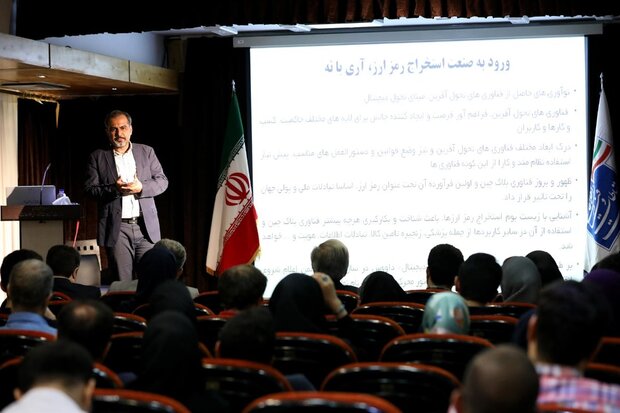Mohammadreza Forouzandehdoust made the remarks during a workshop held for information and communication technology (ICT) reporters and journalists at the venue of ICT Ministry.
In his speech, he explained about different aspects of blockchain technology with an emphasis on its important role in digital economy and the transparency and authenticity of the blockchain technology as a peer-to-peer network.
The challenges of using blockchain, its history, different kinds of blockchain, government and blockchain and the application of blockchain in industry were other issues discussed during the event.
He named the effect of blockchain on authenticity of legal contracts, polls, smart services, e-health, internet of things (IoT) and internet-based transactions as the “disruptive technology”.
For example, in smart contracts, the data on loan and refund are coded with blockchain technology and the process of refunding the loan is done automatically, he said.
In electronic health record (EHR), which is based on blockchain, the patient can decide how much of his or her medical record can be available for the physician and even the patient can limit the time for his or her physician to access the EHR, he added.
Cryptocurrency and its challenges in Iran
For his part, the ITO director Amir Nazemi explained about cryptocurrency, threats and opportunities with an emphasis on the current situation of mining in Iran.
In his speech, he called cryptocurrency and mining as an important manifestation of blockchain, in which the public can take part and reap benefits.
“In fact, hi-tech may not be amongst the public interests, however, some parts of these emerging technologies can directly affect the life of citizens and we are responsible to pave the way for introduction of new technologies,” he explained.
Though in late July, the Iranian government approved cryptocurrency mining as an industrial activity, the energy ministry and the ICT ministry do not agree with the cost of electricity used for mining, he noted.
He said that the emerging technologies should be welcomed in the country, since they may become important part of interaction with other countries in the near future.
ITO plans blockchain projects
To highlight the importance of hi-tech, the ITO plans to secure votes and poll results with blockchain technology under a project and also urges Iranian popular football teams Persepolis and Esteghlal to use blockchain for their clubs’ transactions, an official with ITO Sajjad Fallah announced.
The transparency provided by blockchain is a great achievement for holding polls worldwide, he said.
The ITO calls for startups active in the field of blockchain in order to apply blockchain technology on polls conducted by the unions in November 2018, he noted.
“A total of 26 startups have applied for participation, of which five will be selected to run the project.”
The blockchain will be applied on unions and associations’ polls, which will be held at the ministry of science, he said.
He explained that the project is in its final stages and will be implemented soon.
Fallah then talked about the other project of the organization, which is the usage of blockchain in Iranian leading football clubs, Persepolis and Esteghlal.
One of the main impediments for privatization of these clubs is that their financial transactions are not transparent, he explained.
Another factor is that they are considered as loss-making firms, he said, adding that both of the issues can be solved by applying blockchain technology.
Using proof of authority mechanism of blockchain can limit those who have access to information of the clubs to fans, sports federations and sport ministry, he said.
“They can create token for their fans in order to follow the decisions and financial resources of the clubs.”
Fallah said that the infrastructure will be created in one month, however, “we need a common sense to accept these changes,” he concluded.
MNA/TT

























Your Comment